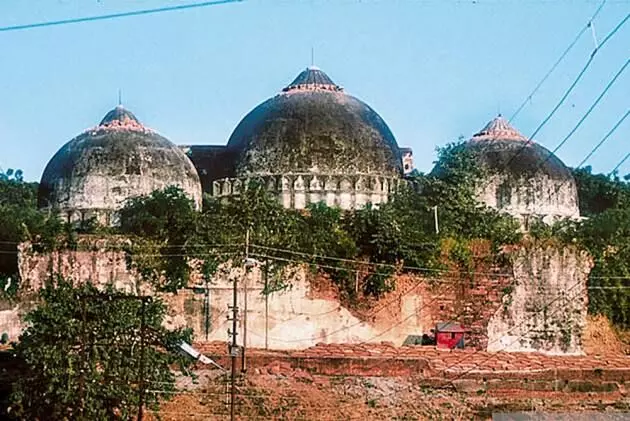
30 years after Babri masjid demolition
text_fieldsBabri Masjid in Ayodhya, which was demolished on 6 December 1992
Three decades into the demolition of the Babri Masjid, which was the cause of profound changes in the social and political fabric of secular India, a retrospect would be quite in place. That will help to know how the second largest country in the world with a population of 135 crores is moving towards fascism while there is a constitution and a system of governance bearing the hallmarks of democracy, secularism and social justice. Babri Masjid was a Muslim mosque built on barren land in Faizabad, Uttar Pradesh by Mir Baqi, who was appointed as the governor by Zahiruddin Babar, the founder of the Mughal empire, after defeating Ibrahim Lodhi in the Battle of Panipat. The said shrine remained under Muslim ownership even during the reign of the British Empire, which ended the Mughal rule and seized power in India. It is also an established historical truth that in post-independence India, Faizabad district administrator K.K. Nair closed the mosque on December 22, 1949 following the claim and encroachment of some of the Hindus. And it was in 1986, when the mosque case was sitting in the files of the Allahabad High Court, and following petitions by both parties, that the district magistrate unilaterally opened the mosque for worship to those who claimed to be devotees of Sri Ram. It was after this that the sangh parivar started raising the construction of the Ram Temple in Ayodhya as a national demand and BJP leader La Krishna Advani went on a nationwide Rath Yatra, paving the way for communal polarization and thereby bringing the BJP to power.
The irony is that all these incidents were taking place when the Congress, which claims to be secular, was still in power. When the mosque was demolished on December 6, 1992, UP was ruled by the BJP, but the union government was in the hands of the Congress led by prime minister PV Narasimha Rao. Despite receiving all the indications in advance that the mosque was planned to be demolished, and almost all the state chief ministers giving full support to the Prime Minister to prevent its demolition, Rao through what can be seen only as deliberate inaction, allowed enough time for the violent weapons-bearing assailants, posing themselves as karsevaks, to complete their heinous crime. But no one can forget the fact either that what subsequently brought the central and state rule including UP under fascist forces through their communal polarisation was the subsequent disunity of the secular political parties.
In February 2002, when Narendra Modi was the Chief Minister, a planned communal riot in Gujarat resulted in the massacre of more than 1,000 innocent people according to official figures. That too, after a train bogey carrying pilgrims returning from visiting the temporary Ram Temple at the Babri Masjid site was set ablaze at Godhra. Whenever serious allegations were made that Narendra Modi and his right-hand man Amit Shah were responsible for the riots, the Sangh Parivar and their administrations denied it in and out of court. However, twenty years later, Union Home Minister Amit Shah, campaigning for the Gujarat assembly elections, has revealed the truth: that since 2002, when the BJP taught a lesson to the rioters, during its rule for 22 years, Gujarat was completely peaceful and free from riots. Also not to be forgotten is the fact that the Supreme Court, which gave the final verdict on the Babri mosque dispute on November 9, 2019, had rejected one by one the lies spread by the Sangh Parivar and their biased historians and media. Muslims used to pray at Babri Masjid and there were no structures or temple at the spot where the mosque stood. But even when stating that the Hindu side had no legal right to the title of the land, the Supreme Court gave weightage to the sentiments of the Hindus and handed over the Babri land to the Hindus. Instead, the court directed the government to allow Muslims to build a place of worship elsewhere. The Muslims, on the other hand, did not resort to staging protest or provocation except expressing their anguish at the verdict. They had already started exploring survival strategies by perceiving the realities of the situation. Their focus is to hold on to their faith and stand on their own feet to survive through education and employment ventures. Even so, the Modi-Amit Shah team, adamant that even that should not be let happen, are concerned that the world is watching them and expressing concern about what the fascist forces say and do. The lesson is that no holocaust can change the course of history.















